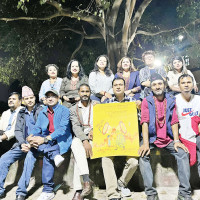- Tuesday, 21 October 2025
A Collection Of Mellifluous Poems
What is the true secret that makes a poem impactful? Is it a mechanical process or beyond it? Here we can have many sayings to mull over like: ‘Get drenched in emotion and the edge of poetry writing knocks the heart and mind on its own.’ Or let us also mention creative quotes of sayings like – ‘composers should not worry even to choose artistic words for poetry writing because it is a job of the sentimental heart and only heart’s words become a beautiful poem.’
These and similar other sayings are deeply meaningful to Dr. Mohan Prasad Joshi’s under-reviewed collection of English poems entitled “A Hundred Flowers to Awareness and Death.” Are the words of poems in this book so deep? The lines of Dr. Joshi’s poems themselves are proof: Sweetness like this does not build up without the spontaneity of emotions.
Is it not a little bit astonishing to find such poems from a medical doctor? No doubt, poet Joshi’s profession is to give care to patients and help them recover from ailments because he is a medical expert.
But it cannot be a point to feel surprised if he writes quality poems. Persons of any profession could come up for writing poems and to this aim the very attraction of the poetical heart is equal to all.
But here, the plus point we see from the profile of poet Joshi is that he has a rich family background in literature because he is the son of the litterateur late Tara Prasad Joshi who one time was the head of the Central Department of Nepali subject at the Tribhuvan University, Kirtipur. And notably, there is already one more poetry book entitled “Kahaan Chha Thaaun” published to his credit.
This time, however, he has come up before readers with an anthology of poems in the English language.
What is also noteworthy here in this regard is he has won nice remarks for his mellifluous poems in this anthology from the country’s noted authors like Sanjeev Uprety, Sridhar Lohani, Tulasi Diwas, Abhi Subedi, Basanta Panta, Arun Gupta, Khem K Aryal, Mohan Prasad Lohani, Yuba Raj Ghimire, Krishna Dharabasi, Keshab Sigdel and Neeva M Pradhan.
So, it would be relevant to talk about the themes and creative merit of Dr Joshi’s poems quoting Robert Frost this line mentioned by Dr Govinda Raj Bhattarai while writing the preface to this book:
“Poetry is when an emotion has found its
thought and Thought has found its words.”
No doubt, as said by Frost, brimming emotions standardise the beauty of poetry writing. Surely, the joys of reading come with this feature for readers.
There are a hundred poems in this anthology and the themes of writing flow in the book in line with the three monumental expressions, life – awareness – and death. How essential are these subjects?
If Dr Joshi had to speak in line with medical terminologies, he would have talked in detail about preventive and non-preventive methods of treatments from knowledge of professional life.
But here in this book, he has enjoyed the unlimited liberty of poetry writing to deal with empowered emotions for words. That’s why he has been impressive to stir serious mood for serious themes.
If we recall the Vedic vision of the life of a man in Kaliyuga, a survival time of one hundred years is a mark of immortality. Yet, death is inevitable. But the ‘flowers’ of the poet in this book are the sense of beauty to interpret both life and death. How can such deep themes unite for expression? The precious connecting theme, according to Dr Joshi, can’t be other but ‘awareness’ itself.
The poet has a good number of poems to express his opinion on both themes – ‘awareness’ and ‘death’. The titles of poems like “This and next rock ‘n’ roll”, “A Day off from active management”, “Lost my reference point”, “Why to Wait?”, “Motherly Lap”, “Without a Glass Wall in Between” and “Last Night Was Strange” offers a delightful reading on the ‘awareness’ theme for poetry lovers. Similarly, for example, the titles like “Art of Dying”, “Make Me a new phoenix every moment”, “A Period at the End of a well-made sentence”, “Perhaps the trio wants to go deeper”, “Wink at each other” and “Beautiful at the borderline” are few examples of impressive poems of the ‘death’ theme.
No doubt, Dr. Joshi’s poetic perception is wide. He picks themes with ease to embellish his sentiments to expand human symbiotic relations, too.
The meaning is the book “A Hundred Flowers to Awareness and Death” is an anthology that tempts readers with artistic expressions even on tough themes of life.
(Kafle is a former Deputy Executive Editor of this daily)

















